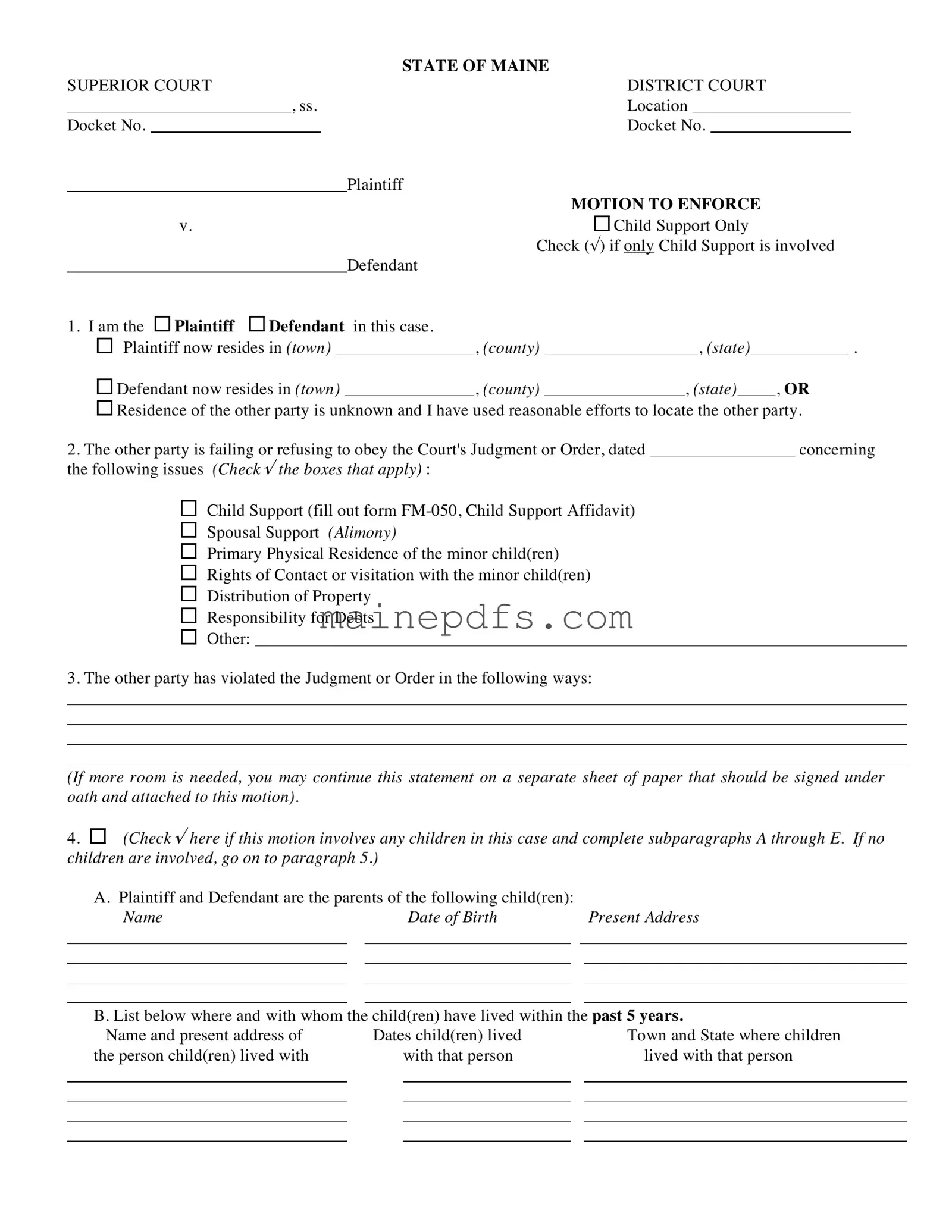|
|
|
|
|
|
|
STATE OF MAINE |
|
|
|
|
|
|
|
|
|
|
|
|
SUPERIOR COURT |
|
|
|
|
|
|
|
|
DISTRICT COURT |
|
|
|
|
|
|
|
, ss. |
|
|
|
Location |
|
|
|
|
|
Docket No. |
|
|
|
|
|
|
|
|
|
Docket No. |
|
|
|
|
|
|
|
|
|
|
|
Plaintiff |
|
|
|
|
|
|
|
|
|
|
|
|
|
|
|
|
|
|
|
|
|
|
MOTION TO ENFORCE |
|
|
|
|
|
v. |
|
|
|
|
|
|
|
|
Child Support Only |
|
|
|
|
|
|
|
|
|
|
|
|
Check (√) if only Child Support is involved |
|
|
|
|
|
|
|
Defendant |
|
|
|
|
|
|
|
|
|
|
|
|
1. I am the |
Plaintiff |
Defendant |
in this case. |
|
|
|
|
|
|
|
|
|
|
|
|
Plaintiff now resides in (town) |
|
|
, (county) |
|
|
|
|
, (state) |
. |
|
|
|
|
|
|
|
|
|
|
|
|
|
|
|
Defendant now resides in (town) |
|
|
, (county) |
|
|
, (state) |
, OR |
|
|
|
|
|
|
|
|
|
Residence of the other party is unknown and I have used reasonable efforts to locate the other party. |
2. The other party is failing or refusing to obey the Court's Judgment or Order, dated |
|
concerning |
the following issues (Check √ the boxes that apply) : |
|
|
|
|
|
|
|
|
|
|
|
|
Child Support (fill out form FM-050, Child Support Affidavit)
Spousal Support (Alimony)
Primary Physical Residence of the minor child(ren)
Rights of Contact or visitation with the minor child(ren)
Distribution of Property
Responsibility for Debts
Other:
3. The other party has violated the Judgment or Order in the following ways:
(If more room is needed, you may continue this statement on a separate sheet of paper that should be signed under oath and attached to this motion).
4. |
(Check √ here if this motion involves any children in this case and complete subparagraphs A through E. If no |
children are involved, go on to paragraph 5.) |
|
|
|
|
|
A. Plaintiff and Defendant are the parents of the following child(ren): |
|
|
|
Name |
Date of Birth |
|
Present Address |
|
|
|
|
|
|
|
|
|
|
|
|
|
|
|
|
|
|
|
|
|
|
|
|
|
|
|
|
|
|
|
|
B. List below where and with whom the child(ren) have lived within the past 5 years.
Name and present address of |
Dates child(ren) lived |
|
Town and State where children |
the person child(ren) lived with |
|
with that person |
|
lived with that person |
|
|
|
|
|
|
|
|
|
|
|
|
|
|
|
|
|
|
|
|
C.Plaintiff has not been involved in any way in, and has no information about, any court case in any state concerning the custody of the child(ren), except as follows:
Protection from Abuse State/Court/Docket No.:
Protective Custody State/Court/Docket No.:
Other (describe what kind of other case)
D.No one other than the parties has physical custody of the child(ren), or claims to have custody or visitation rights with respect to the child(ren), except as follows:
E.(Check √ all of the following boxes that apply)
(1) No public assistance benefits have ever been received for the child(ren).
(2) Public assistance benefits have been, are now, or will be received for the child(ren).
(3) The Department of Human Services has been contacted to review, change or enforce a child support order regarding the child(ren).
If you check box 2 or 3, you must send a copy of this motion to the Department of Health & Human Services, Support Enforcement Division, Central Office Supervisor, 11 State House Station, Augusta, ME 04333-0011.
5.WHEREFORE, I ask the Court to find that the other party has failed or refused to obey the Court's Judgment or Order and enter an order requiring the other party to:
A.Permanently stop disobeying the Judgment or Order in this case.
B.Obey and comply with the Judgment or Order by requiring the party to do the following:
C.Other (You must be specific about any other relief you are requesting):
D.Pay my costs of this case, including reasonable attorney's fees.
And I ask the Court to grant such other relief as it deems just and proper.
Date: |
|
|
|
|
|
|
|
|
|
|
|
Signature of |
Plaintiff |
Defendant |
|
|
|
|
|
|
Address: ____________________________ |
|
|
|
|
____________________________ |
|
|
|
|
|
|
Phone: ____________________________ |
|
|
|
STATE OF MAINE |
|
|
|
_______________________County |
|
|
|
|
|
|
|
Personally appeared the above named |
Plaintiff |
Defendant |
|
|
|
|
and made Oath that the foregoing statements, including those in any attached sheet(s), are true. |
|
|
Before me,
Date:
Attorney at Law / Notary Public / Deputy Clerk
FM-070, Rev 01/09
IMPORTANT WARNING TO THE OTHER PARTY
You are hereby notified that, if you oppose this Motion, you may file with the Court a memorandum and any supporting affidavits or other documents not later than twenty (20) days after the filing of this Motion, unless another time period is provided by the Maine Rules of Civil Procedure or set by the Court.
You have the right to appear and be heard at all courts events (trial, hearing, conference, mediation). If you fail to appear at any or all court events without good cause, action may be taken on your case even though you are not there. This means that the Court may, in your absence, enter an interim/temporary order, OR hold a final hearing and enter a final order or judgment regarding any or all of the issues in your case, including but not limited to paternity or parentage, parental rights and responsibilities for children (custody, residence, contact, visitation, etc), child support, spousal support/alimony, attorney fees, and distribution of marital and non-marital property (debt, real estate, vehicles, personal property, pension and retirement accounts, etc). The Court also has the option to dismiss any pleading that you have filed if you do not show up. It is your own responsibility to be sure that the Court has your correct address. Any change of address must be in writing and delivered to the Clerks office by hand or regular mail.
The District Court is located at:
|
|
|
|
|
|
|
|
|
|
|
|
|
SERVICE |
|
|
|
|
|
|
|
|
|
|
|
|
|
|
|
|
|
|
|
|
|
|
|
|
|
|
|
|
|
|
|
|
|
|
STATE OF MAINE |
|
|
|
County of |
|
|
|
|
|
|
,ss. |
|
|
|
On |
|
|
|
(date), |
I served the Motion to Enforce upon Respondent by delivering a copy of |
|
|
|
same at the following address: |
|
|
|
|
|
|
|
|
|
|
to the above-named Respondent in hand. |
|
|
|
to |
|
|
|
|
|
|
|
|
|
|
(name), a person of suitable age and discretion who was then |
|
|
|
residing at Respondent’s usual residence. |
|
|
|
to |
|
|
|
|
|
|
|
|
|
|
(name), who is authorized to receive service for Respondent. |
|
|
|
by (describe other manner of service): |
|
|
|
Costs of Service: |
|
|
|
|
|
|
|
|
|
Service: |
$ |
|
|
|
|
|
|
|
|
|
|
|
|
|
Travel |
$ |
|
|
|
|
|
|
|
|
|
|
|
|
|
Postage |
$ |
|
|
|
|
|
|
|
|
|
Signature of person making service |
|
|
|
Other |
$ |
|
|
|
|
|
|
|
|
|
|
|
|
|
Total |
$ |
|
|
|
|
|
|
|
|
|
Title |
|
|
|
|
|
|
|
|
|
|
|
|
|
|
|
|
|
|
|
|
|
OR
I, the Plaintiff Defendant, have completed service by:

 Signed Acknowledgment (form CV-036)
Signed Acknowledgment (form CV-036)

 Certified Mail, Restricted Delivery, Return Receipt
Certified Mail, Restricted Delivery, Return Receipt

 Acceptance of Service
Acceptance of Service
FM-070, Rev 01/09






 Signed Acknowledgment (form
Signed Acknowledgment (form 
 Certified Mail, Restricted Delivery, Return Receipt
Certified Mail, Restricted Delivery, Return Receipt
 Acceptance of Service
Acceptance of Service